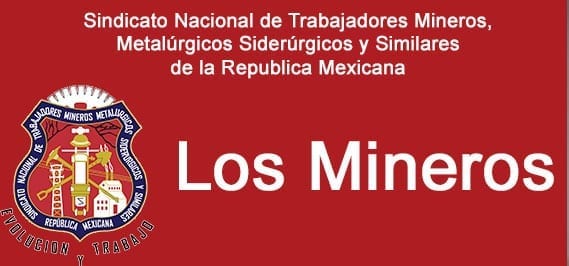
Nov 20, 2017
A group of armed civilians calling themselves the “Tonalapa Community Police,” attacked striking workers at the Media Luna gold mine in Mexico on November 18, killing two workers. The two men killed were brothers, Víctor and Marcelino Sahuanitla Peña.
Workers at the Cocula, Guerrero, gold mine went on strike earlier this month after their employer recognized the Confederation of Workers of Mexico (CTM) union, a labor organization with a history of acting as “protection union” by assisting employers in blocking independent unionization efforts. The independent mineworkers’ union, SNTMMSSRM (Los Mineros), had filed for a union election on October 13.
On November 16 and 17, union leaders and the employer negotiated a peaceful resolution which called for the withdrawal of armed security forces and an expedited union representation election. The talks came after scores of armed police forces arrived at the mine, taking over the site on November 13.
“This is an outrageous and unacceptable attack on freedom of association and fundamental human rights,” says Solidarity Center Executive Director Shawna Bader-Blau. “The perpetrators must be found and held accountable.
“We stand with Los Mineros and workers everywhere who seek to peacefully form unions of their choosing,” she says.
Workers say an army squadron detained the attackers, some of whom they identified as CTM leaders, but immediately released them. The government has now sent in armed security forces.
In a statement, the United Steelworkers in Canada urged the Canadian government to “intervene with Mexican authorities and the company to recognize the basic rights of Mexican workers and prevent further violence.”
Canada-based Torex Gold Resources owns the Media Luna mine.
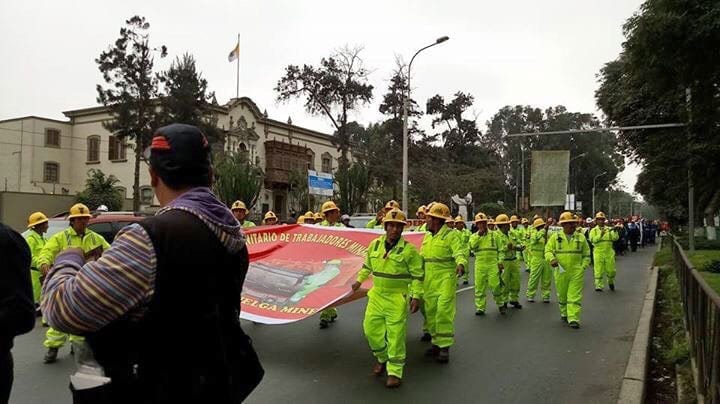
Aug 15, 2017
Talks between Peruvian mineworkers and the Ministry of Labor over proposed labor law reforms came to a standstill after the government began retaliating against workers who took part in a recent nationwide strike, despite promises not to do so, according to the National Federation of Mining, Metallurgical and Steel Workers of Peru (FNTMMSP).
The government and FNTMMSP agreed to a monthlong series of negotiations after mine workers from 56 unions in Peru went out on an indefinite, nationwide strike July 19 to protest the government’s proposed reforms to loosen workplace safety rules, make it easier to fire workers and shift the burden of paying into an unemployment fund to workers from employers.
The director of the Peruvian Labor Ministry contacted each company where workers went on strike to clarify that the strike was illegal, a move that could result in discipline or dismissal of the workers involved—and could send a warning that “workers do not dare in the future to exercise our right to strike,” according to the union.
“We call out the mining employers who, seeking to intimidate miners throughout Peru, have sent notarized letters to workers who participated in the struggle challenging their inalienable labor rights to do so. We respond with firmness: We know our rights—such as the right to strike, and we know when the employer violates labor laws, does not comply with collective bargaining agreements, and excessively abuses the labor rights of its workers,” FNTMMSP says in a statement.
Although the right to strike is protected under Peruvian law, the freedom to strike is restricted. The government declared the mineworkers’ strike out of compliance with legal requirements, as it does for most major strikes. The Mineworkers Federation has appealed the determination.
“If the dialogue is not resumed and the signed agreements are not fulfilled, we will take measures necessary to enforce our rights, which are also the rights of all the workers of the country,” FNTMMSP says.
“If there is no solution, the strike continues.”
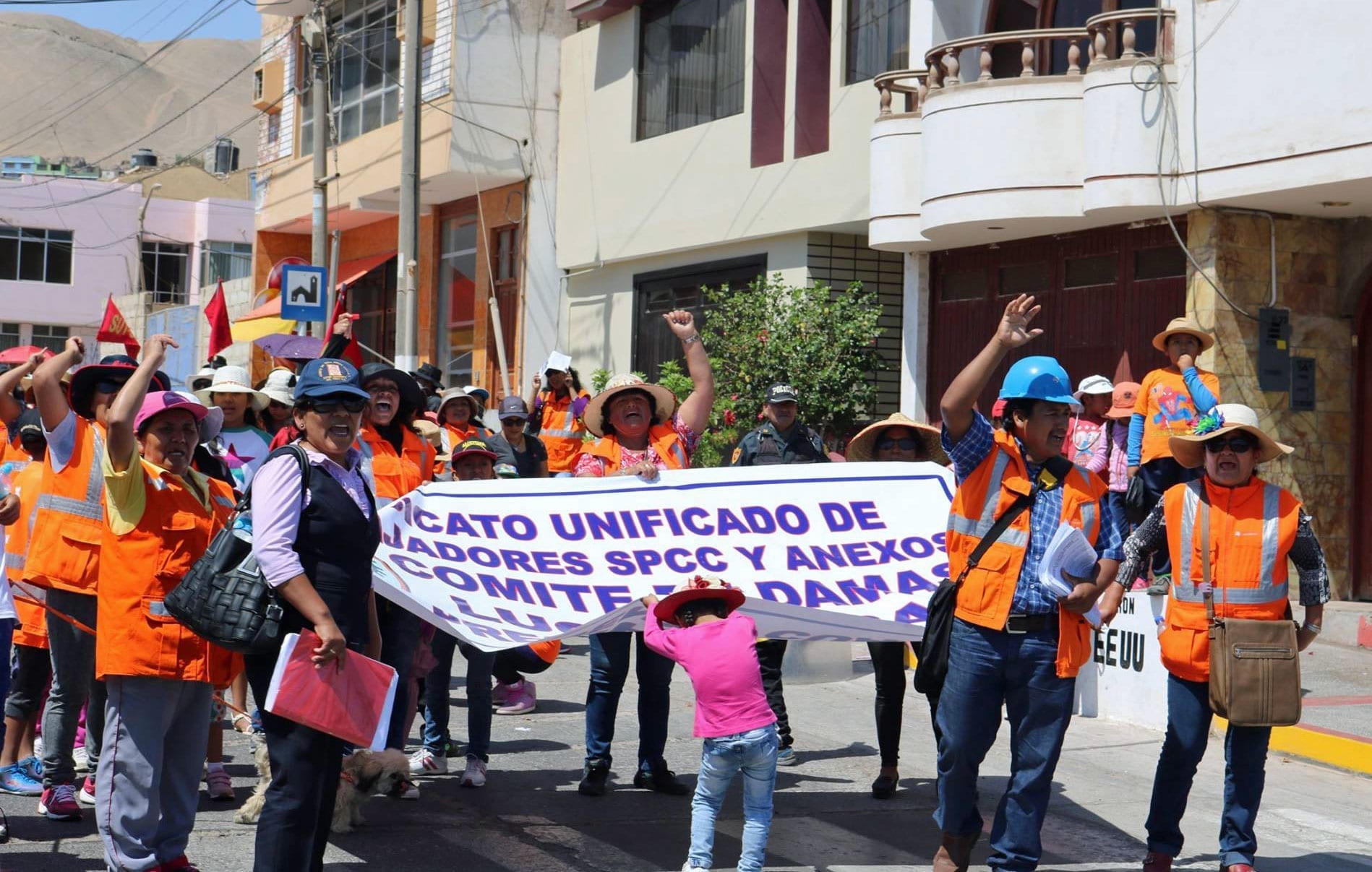
Apr 17, 2017
Update: Striking mine workers are standing strong despite the Peru Ministry of Labor declaring their strike illegal during a second appeal process yesterday and company threats to fire all the workers if they do not return to work by Wednesday. Construction workers, members of the Peruvian General Workers Confederation (CGTP), announced that they will join the strike in solidarity.
On Sunday, police fired tear gas at strikers as they walked a picket line near an industrial railroad bridge above the Osmore River. The striking workers now control both sides of the bridge, preventing rail passage of the minerals from the mines to the nearby town of Ilo, where there is the refinery and the port. On Tuesday, the SUT-SPCC union is conducting worker assemblies in Ilo to make decisions for next steps.
……………….
Some 2,000 miners on strike at Southern Copper Corp. in Peru (SPCC) are meeting with government negotiators again today over issues that prompted their walkout: improved profit-sharing, better medical care, an end to company surveillance of workers and the reinstatement of dismissed workers. (Workers and their families rally in this video.)
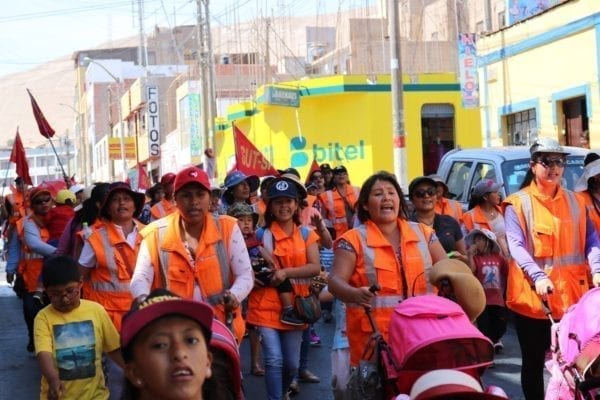
Miners’ families rallied in support of the striking workers. Credit: Colectivo Resistencia Sur Tacna
The miners, members of the Sindicato Unificado de la Southern y Anexos (SUT SPCC), went on strike last week after negotiations broke down, halting operations at the Toquepala and Cuajone mines. The union’s general secretary, Jorge Campos, was arbitrarily dismissed in 2016, according to the miners, and his reinstatement is among their demands.
From the United States, the United Steelworkers condemned the company’s attempts to fire striking workers and the decision of the Peruvian Labor Ministry to declare the strike illegal. The ministry argued the issues are not subject to collective bargaining and the union has appealed the ruling.
IndustriALL Director Fernando Lopes also condemned the actions of the company, noting it is part of Grupo Mexico, “known for its violations of freedom of association in Mexico and the USA. Peruvian workers will not let the company do the same thing to them. We extend all our support to the union and the federation.”
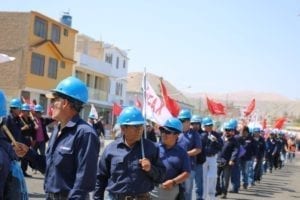 Also, IndustriALL General Secretary Valter Sanches wrote to SPCC company president, Oscar González Rocha, to urge him to negotiate in good faith with the SUT SPCC.
Also, IndustriALL General Secretary Valter Sanches wrote to SPCC company president, Oscar González Rocha, to urge him to negotiate in good faith with the SUT SPCC.
The SUT SPCC is affiliated to the National Federation of Miners and Metalworkers of Peru (FNTMMSP), which is in turn affiliated to IndustriALL Global Union.
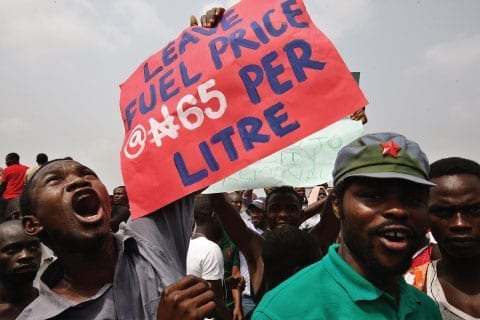
May 17, 2016
Nigeria’s largest trade union federations will call a nationwide strike May 18 unless the Nigerian government returns fuel subsidies it removed on May 11.
Meeting over the weekend, the executive councils of the Nigeria Labor Congress (NLC) and the Trade Union Congress of Nigeria (TUC), which together represent millions of workers, along with civil society organizations, decried the nearly 50 percent hike in fuel prices caused by deregulation and called on the government to return fuel subsidies and prosecute those involved in subsidy scams.
In a joint statement, the groups said that over the past five years, “there has been no increase in salaries or wages or pensions in the face of devaluations, spiraling inflation and other vagaries of the economy,” making the rising price of fuel “unrealistic, unaffordable (and) unacceptable.”
More than half of Nigeria’s population lives below the international poverty line of $1.25 a day, according to the most recent figures from UNICEF.
Although Nigeria is Africa’s biggest petroleum producer, the country imports nearly all of its refined fuel, unlike most members of the Oil and Petroleum Exporting Countries (OPEC), and is currently facing a severe shortage. Unions and civil society organizations are urging the government to create enhanced local refining capacity to permanently solve the problem of scarcity.
Eighty percent of Nigeria’s foreign currency comes from the petroleum industry.
The groups pointed out that the volatility of the country’s black market makes it unlikely the government will be able to stop fuel prices from rising further. They also cited the plunging local currency, the naira, which has rapidly begun depreciating against the dollar since deregulation, as furthering limiting consumers’ ability to purchase basic goods.
In calling for government measures to reverse fuel deregulation, the groups also are pushing for reform in the electricity sector, urging the government to end billing based on estimating electricity usage and make meters available to consumers.
When the government last attempted to deregulate fuel prices in January 2012, striking workers and students shut down airports, offices and shops, paralyzing the country for 10 days. At least 10 people died and hundreds were injured during the strike. Workers returned to their jobs after the government partially restored the fuel subsidy.
Unions also are calling on the government to involve labor in negotiating key policy issues and reverse privatization processes long pushed for by the International Monetary Fund and World Bank, including deregulation, which the groups say contravene “the constitutional provision that says government shall be the driver of the economy.”
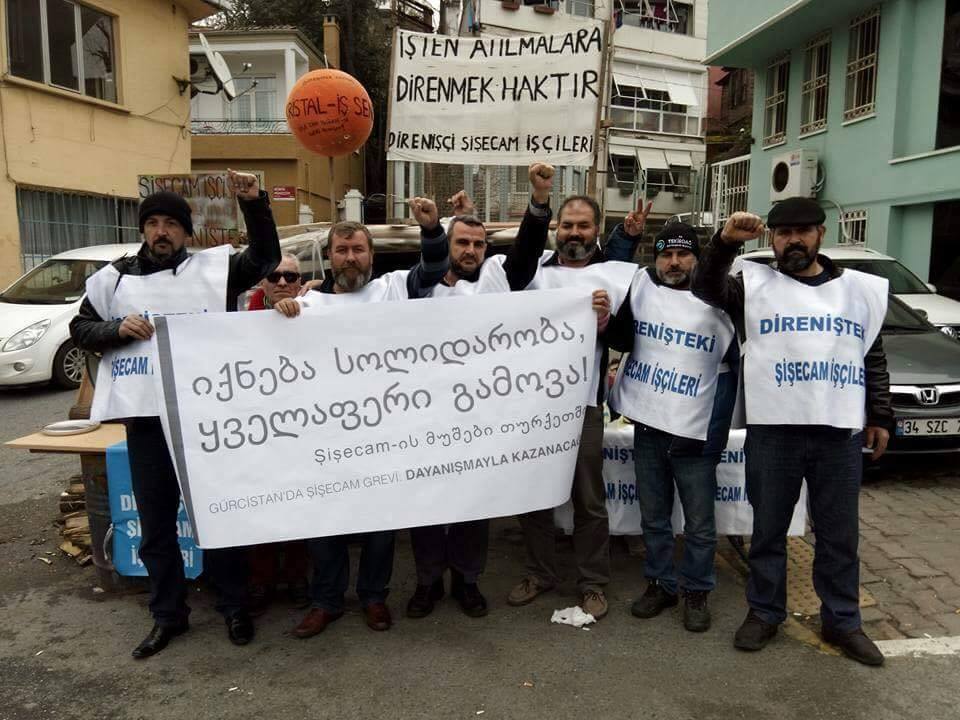
Mar 17, 2016
In Georgia, coal miners in Tkibuli and glass factory workers in Ksani recently made big gains at the workplace with the assistance of the Metal Workers, Miners and Chemical Industry Workers’ Trade Union (MMCIWTU) and the Georgian Trade Unions Confederation (GTUC).
Despite tough opposition from their employers, both groups of workers waged successful strikes and won significant wage increases, with miners also gaining key job safety and health improvements.
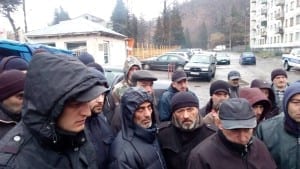
Miners in Georgia won key contract demands, including a wage increase and improved job safety and health. Credit: MMCIWTU
Some 750 miners went on strike in February, seeking wage increases promised during their last strike in 2011. The workers, employed by the Georgian Industrial Group (GIG), which operates two mines in Tkibuli, walked out before notifying union leadership of their intention.
But with GTUC President Irakli Petriashvili and MMCIWTU President Tamazi Dolaberidze at the bargaining table, miners returned to work in 16 days with a new contract that includes a 7 percent pay increase starting March 1 and an additional 3 percent hike beginning April 1—and will be paid for half of the days they spent on the strike with no punishment for strike leaders. The company also has agreed to address salary imbalances.
GIG supplies coal from Tkibuli primarily to cement-producing factories in Georgia and is one of the country’s largest corporations, with operations in energy generation, natural gas and real estate.
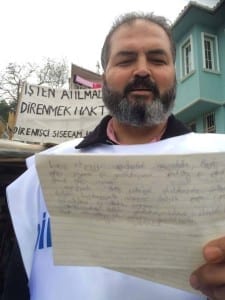
JSC Mina factory workers received wide international support for their strike. Credit: MMCIWTU
At the JSC “Mina” glass container factory, 170 workers—80 percent of the workforce—went on strike February 5 after months of contract negotiations which stalled when the company did not address workers’ key issues, including a wage increase.
Throughout the 30-day strike, glass workers won wide international support, with employees of the JSC Mina Turkey-based parent company, Sisecam, holding a solidarity action backing striking workers. The Sisecam workers also sent their Georgian brothers and sisters a message: “Workers of “Mina” are symbol of fight for just cause, wherever human rights are violated we should be there and fight together!”
The global union federation IndustriALL, the Eurasian Metal Workers Federation, the Turkish union DISK and unions in Ukraine, Russia, Belarus, and Kyrgyzstan sent protest letters to the company and support letters to the glass workers. GTUC affiliate organizations and non-governmental organizations also backed the workers.
Petriashvili and Dolaberidze ultimately negotiated a 7.5 percent pay increase beginning January 1, 2017, and the company agreed to the workers’ demand for a location to hold union activities.





 Also, IndustriALL General Secretary Valter Sanches
Also, IndustriALL General Secretary Valter Sanches 


